- Home
- Deborah Smith
Legends Page 6
Legends Read online
Page 6
She and Rob had been entertained watching their normally reserved mother and father snuggle close together on a sagging couch while a musty stag’s head peered down at them with its one remaining glass eye. Rob had wrinkled his nose at the kissing and hugging, but Elgiva had been old enough to appreciate the romance of it.
Though it had hardly sounded like romance.
“David, you’ll be a silly old man, the kind who sings to himself and dances under the full moon,” Mother told Father between kisses.
Father laughed. “Aye, and I plan to live to be a thousand just to torment you.”
“I’ll scold you every day of it,” she retorted, but nibbled his ear. Then she looked at him and said so low that Elgiva could barely hear, “When you pass on, I wish to follow the next second.”
Mother had gotten that wish, though much sooner than a thousand years. Swallowing hard, Elgiva shut the book of poetry and sat gazing wistfully at the worn leather cover.
“That must be a cookbook. You look pensive—as if you’ve lost the recipe for something.”
Douglas Kincaid’s droll, richly timbered voice slipped into her veins like sweet wine. She looked up at him and blinked owlishly. He lounged in one corner of his cell, wearing nothing but his trousers. His torso glistened with sweat from all the push-ups he’d performed during the past two hours. The muscles of his chest and stomach trembled and flexed each time he inhaled.
“Lost the recipe,” she repeated blankly.
Elgiva stared at the potent masculinity being displayed only a few meters away, behind thick bars. Who needed protecting from whom? She was beginning to resent those bars.
She had taken to reading the book of Scottish poetry to keep from ogling him helplessly. The sight of his hard, lean body pumping like an unstoppable machine had made her weak inside. Looking away hadn’t solved the problem, because the soft, urgent sounds of his breathing had induced even more imaginings.
Now Elgiva leapt up and busied herself returning the book to a sideboard against one wall. “Lost a recipe. Aye, you might say that I did. Long ago. Well, time to go let Shom back in. If he stays out in the sunshine much longer, he’ll have spring fever months before it’s due.”
Sensing Kincaid’s dark eyes on her, Elgiva fussed with the other books stacked atop the table. “You’ve been in a bonnie mood today, Douglas. Things will go pleasantly if you keep your spirits up this way.”
“I’m finally adjusting to life without phones, that’s all. Do you want to know how many phone calls I average during a workday? Upward of a hundred. You did a cruel thing by making me give that up cold turkey. But if I’m mellowing out, it’s only because I know that somebody’s going to spring me from this joint soon.”
“You’ll be here until the MacRoth estate is free and clear. But if your fantasy cheers you, keep believing it. I like you when you’re lighthearted.”
“Why, thank you. I wouldn’t want to depress you with my insignificant problems.”
His taunt was mild—charming, in a sardonic way. She curtsied slightly, enjoying the new atmosphere. “Now if you’ll excuse me, I’ve got to get my pudding started for supper.”
He groaned. “You realize, of course, that I’m doing a push-up for every calorie you feed me.”
“Then you should add a few thousand.”
He shrugged, came forward, braced one long arm on the cell bars above his head, and leaned, hip-shot. He scanned her from head to foot, slowly. “Might as well do push-ups. I’ve got no other way to release my tension.”
“Poor man.” She sighed dramatically and added, as if speaking to a third party, “And him so accustomed to getting his way with women.” She eyed him boldly. “You won’t find a good wife if you wait much longer. You’re getting a wee bit long in the tooth.”
He smiled wickedly. “It’s not the length of my tooth that matters to women. Don’t worry about me, doll. I’ll marry the perfect wife.”
“Oh? Dumb as an ox and twice as forgiving?”
“No. She’ll be extremely intelligent and have a brilliant grasp of business. I want a partner—someone I can trust to head a few of my biggest projects. But she’ll also be an expert at entertaining. She’ll be the kind of woman who can organize a party for fifty of my favorite stockbrokers one night and host the President and First Lady for lunch the next day. She’ll know how to pick the classiest clothes and the best wine.”
“I think you need a harem. The poor woman is going to be worked to death.”
“Oh, she’ll be a brilliant manager, and her staff will handle the details. Whenever she needs a rest, I’ll take her down to my island in the Caribbean. Or to the chateau outside Paris. Or the ranch in Colorado. Or the estate in Florida. Or my new estate in Scotland—”
“Don’t marry a homebody. She’d get confused trying to figure out which home.”
“I’ll want her to love kids and dogs.”
“Well, you can always buy her a few.”
“She’ll be beautiful, of course.”
“Of course.”
“And blond. And blue-eyed.”
“And petite. You forgot petite.”
He sighed happily, as if picturing the future Mrs. Kincaid. “Yes, petite. Thank you for reminding me.”
“But you’d be mean to marry a petite woman, Douglas. She’d only get crushed by your ego. A flattened blue-eyed blonde. Ugh. You need a big, swarthy woman who’ll remind you of your Neanderthal background.”
“Doll, I’ve got one of the world’s best collections of sapphires. I’ve been buying them for years. They’re the perfect color for a blue-eyed blonde to wear. Now what would I do with ten million dollars worth of sapphires if I changed my mind?”
“You don’t want me to tell you what you should do with your sapphires.”
He chuckled sardonically. “No, I think I can guess.” Arching a black brow, he gave her an appraising look. “So why haven’t you remarried?”
“There aren’t a lot of likely men in Druradeen. It’s a small place.”
“What? You don’t know any eligible bachelors in the kidnapping business?”
Elgiva huffed in exasperation. “Plus I have no dowry to offer.” She shot him a scathing look. “Yet.”
“Dream on, doll.” He studied her, looking intrigued. “Why do you need a dowry?”
“Marriages are built on practical concerns. Land, money, children. I have naught to offer.”
His gaze trailed down her sweater and skirt. “Oh, I wouldn’t say that. In that green evening gown you could have made any man forget about dirt, dough, and dynasties.” His voice became coy. “In the meantime, I wouldn’t mind being entertained. Have you got the green dress here? Wear that when you do your knitting.”
“It’s a joy to watch such an overindulged beast learn the merits of patience.”
“Patience? You mean I’ll get what I want, eventually?”
Elgiva winced inwardly. Why was her mouth making offers that her honor couldn’t keep? “You can’t always get what you want, Douglas. Perhaps this time you’ll get what you need, instead.”
He looked amused. “Did you ever write a song for the Rolling Stones?”
“Hmmmph. A rock and roll group. Mick Jagger. I know them. Their albums are sold in the stores in Edinburgh.”
“You didn’t pull off a kidnapping in the middle of Manhattan without knowing the city pretty well. How much time have you spent in the United States?”
“You won’t get incriminating information out of me. But that was a nice try.”
He slid a hand down his sweaty stomach, stroking the streak of silver hair amidst the black as he gazed thoughtfully at her. His hand moved with the unselfconscious sensuality of a man who was very comfortable with his body. Elgiva tracked the up-and-down action without blinking.
“I’ll get a lot out of you before I’m done,” he murmured, with a thin, confident smile.
She exhaled raggedly and clucked her tongue. “If you can catch me, you can have me.”
“I’ll consider that a promise.”
“Hoots, man! You’d wish that you’d been tossed into a pit with a dozen lions, instead.”
“You’re always so creative with your threats. What do you do when you’re not kidnapping people? I know! You’re a tax collector.”
She waved toward the other room, with its kitchen. “Perhaps I’m a chef.” Elgiva pointed to the pile of knitting she kept in a woven basket. “Perhaps I make sweaters for a living.” She gestured at the books. “I could be a teacher. Or a writer.”
“No. Hmmm, let me guess.” He hooked his thumb into his trousers and let his fingers tap lightly on the dark woolen material not far above the bulge in the crotch. Elgiva’s stomach quivered. Was his enticement calculated, or was it enticement at all? Perhaps she only imagined it. Overwrought fantasies were the price one paid for years of emptiness.
“You rob banks,” he said, studying her through narrowed eyes. “Because God knows there’s not any other way to make a lot of money around Druradeen. You needed quite a bit to fund your little kidnapping project. Of course, the other fanatics in your gang contributed some dough too.”
“My gang? Next you’ll be calling me ‘Ma MacBarker.’ I keep telling you that there’s no gang, Douglas. I sold some jewelry of my mother’s to pay my kidnapping expenses.”
“Another thing. Could you please pronounce my name correctly? It’s Dug-less.”
“Not in the homeland. You’re a Dooglas here.” She took a deep breath and plunged forward, hoping that his mood would make him receptive, finally. “You’re Dooglas Kincaid, the last of the Kincaids of Talrigh, one of the mightiest clans of the highlands.”
He gazed at her silently, looking bewildered and a little angry. “You said something about my clan once before. ‘Kincaid’ may be a Scottish surname, but it’s not traceable. I’ve paid experts to try.”
“You didn’t have to pay. All you had to do was come to the right people yourself. We don’t take to foreigners sending their stooges to do a Scot’s duty for him.”
He straightened ominously. “Are you trying to make me feel some kind of old-world kinship? You think I’d fall for that kind of hoax?” His next few words were pithy and obscene.
Elgiva rebuked herself for telling him. He wasn’t ready to believe. “I’m not making it up, Douglas. I’m not trying to win your friendship with a lie.”
“Right. I’m gonna believe that too.” His eyes flickered with disgust. “If I were of Scottish descent, my people would have discovered it.”
“Only if you were of any clan other than the Kincaids. There’s not much history written on them, you see. Most of what is known are stories passed down among the other clans. Only a few ballads and poems mention the Kincaids. No more than that.”
“I am not of Scottish descent!” He jabbed a finger through the bars at her. “Nobody knows how the first Kincaid got to America, or why, or when. Don’t try any sentimental crap on me, doll!”
Elgiva drew her chin up and eyed him coldly. “The crown banished Tammas Kincaid and sentenced him to live the rest of his life in the American colonies. The year was 1722. Tammas’s clan had been destroyed on the crown’s orders, and all mention of their history taken from the records. Even their ancient clan charter was revoked. The Kincaids were no more—it was as if they had never existed.” She put her hands on her hips. “And that, Douglas, is how your ancestor ended up in America.”
“You could have concocted a more sympathetic story if you wanted to stir up my interest.”
“Aye, I could have made up all sorts of charming tales about the Kincaids. But I didn’t do it. I told you the unadorned truth.” She held out her hands in supplication. “But your people do have a proud history. Even their destruction was glorious. And if you’ll just listen—”
“Here it comes,” he said sarcastically. “The hook. Forget it, doll. Save your legends to peddle to the tourists. After you get out of prison, of course. Ye Old Legend Teller. I’ll give you a booth.”
She balled her hands into fists. “Why do you want to ruin something without at least trying to understand it first?”
“I’m not going to ruin anything! When Douglas Kincaid does something, he does it first-class! The best gardeners, the best decorators, the best management. I’ll turn the MacRoth estate into a showplace.”
“You’ll just be a foreign laird despised by all the dear people you evict from their lands and their homes only so that you can have privacy.”
“They can move to another estate and pay rent there! Haven’t you ever heard of moving? Is that a totally unknown concept in your country?”
“They’ve lived in and around Druradeen for generations!” She threw up her hands in despair. “You’re a fool! You’ll come to the same end as the rest of your kin, with your pride in shambles!”
“My kin are in America, where their pride is very healthy, thank you.”
“Och! I’d like as not get more sense out of a stone wall!”
Elgiva wheeled and marched to the other room, then slammed the door behind her. Angrily she shoved pots and pans around on the stove. Forget the pudding, she told herself. She’d fry some lamb chops to a black crisp and then set them outdoors to get cold and hard. Let his pride gnaw on those!
She lit a burner, flung a heavy skillet onto the stove top next to it, then dug her fingers into a container of sausage drippings and threw the gooey oil at the skillet. It missed and hit the burner.
Elgiva jumped back immediately as flames shot up, but they caught her outstretched hand and ignited the grease on her fingertips. Like some horrible magic trick, flames sprouted there. She stabbed her hand into her skirt and suffocated the flames in its plaid folds. A wave of pain radiated up her arm. Her stomach twisted sickly, and her legs almost collapsed.
She smothered the stove fire with the skillet and cut the burner off. Staggering, she went to the sink and ran water over her fingers. Their ends were an ugly red, and the tips of the nails looked as if they’d melted. Elgiva nearly gagged on the pungent odor.
The pain made her shiver and chew her lip, but after a few minutes the icy water revived her. Breathing heavily, she wrapped her hand in a towel and returned to the main room, where she kept a medicine chest under her bed.
Douglas Kincaid stepped out of his washroom, dressed in the thick blue robe she’d provided. He had just taken a shower, and was toweling his wet hair vigorously. When he saw her heading for the bed he grunted. “Need a nap? You must be worn out from carrying that self-righteous attitude around.”
Elgiva ignored him and sank to her knees. With her good hand she dragged a heavy wooden chest from beneath the bed and flipped the lid open. As she fished through tubes and bottles and medical implements, she heard Kincaid moving to the front of his cell. “Is that your witch’s kit?” he taunted. “Gonna mix a little ‘eye of MacNewt’ into the pudding? Or maybe some hemlock?”
Nausea assailed her again. She leaned against the bedstead and shut her eyes, waiting for it to pass. Across the room Kincaid grew very still; either that or she couldn’t hear his movements above the buzzing in her ears. Finally the buzzing faded. Elgiva realized that Kincaid was speaking to her.
“Just bring the chest and come here,” he repeated. “Let me help, if I can.” Amazingly, he sounded serious and reassuring, almost gentle.
Elgiva wiped cold perspiration from her forehead and looked at him, her head still resting on the side of the mattress. “Why?”
One corner of his mouth quirked up in a grim smile. “Because I’ll starve if you faint.”
“Don’t worry, Douglas. I’ll have a go at cooking as soon as I get myself fixed up.”
“What happened to you?”
She lifted her wrapped hand, trying not to wince, then let it rest in her lap again. “I burned my fingers in some grease. That’s what I get for letting a Kincaid make me mad and reckless.”
“Come here. Just come here and sit at the table. Let me see what I can do f
or your toasted claws.”
Her head muddled by the pain, she ignored the warning that said Douglas Kincaid was probably going to do something awful to her. Elgiva got up, wavered a moment, then took a deep breath and clasped the chest’s handle. She pulled the awkward box across the room to the serving table and hoisted it to the top. Then she slumped into a chair and put her head down weakly. She eased her burned hand toward the opening in the cell bars.
Kincaid tucked his robe a little tighter around himself and put a chair close to his side of the bars. He sat down and reached through with both hands, his gaze locked on her. “I’ve seen mimes who weren’t as white-faced as you are right now.”
“The burns aren’t so bad,” she told him, panting lightly. Elgiva raised her head and looked at him stoically. “It’s just the idea of them. Of being burned in a fire. My parents died that way.”
He took her hand between his, and she waited fearfully to see how her trust would be rewarded. But he was very careful not to hurt her as he unwrapped the towel, and when her hand lay bare in his he held it with supreme gentleness. Confused, she warned him softly, “I can’t turn you loose, no matter how much you surprise me.”
He opened the medicine chest and studied the contents as if he hadn’t heard her. “My sister was burned badly once. When she was six or seven. We had a crummy apartment that was impossible to keep heated in the winter—it had old steam radiators. One developed a crack. She didn’t hear it hissing, and she stood too close. It gave her a second-degree burn across the middle of her back. For six weeks everybody in the family took turns changing the dressings. It hurt her so much that she and I always ended up crying.”
“But how did she miss hearing the steam?”
He lifted a tube of ointment from the chest and studied the label. “Will this do?”
“Aye.”
Kincaid opened the tube with the fingers of one hand, while the other hand continued to hold hers. “She’s deaf. She had a severe infection when she was a baby, and it ruined her hearing.”
“I’m sorry.” Elgiva marveled at his dexterity as he manipulated the ointment onto her fingers with a featherlight touch. Those brawny hands were very good at small, human things. She pictured Kincaid as she had never imagined him before—a worried, upset teenager gently putting medicine on his little sister’s back.

 Legends
Legends Hold on Tight
Hold on Tight Just a Little Bit Guilty
Just a Little Bit Guilty The Beloved Woman
The Beloved Woman Alice At Heart
Alice At Heart Heart of the Dragon
Heart of the Dragon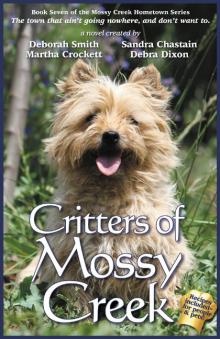 Critters of Mossy Creek
Critters of Mossy Creek Diary of a Radical Mermaid
Diary of a Radical Mermaid Caught by Surprise
Caught by Surprise Stranger in Camelot
Stranger in Camelot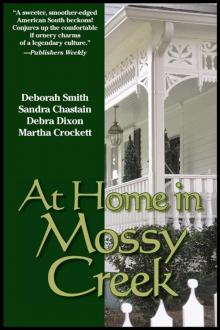 At Home in Mossy Creek
At Home in Mossy Creek Charming Grace
Charming Grace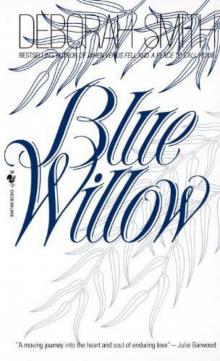 Blue Willow
Blue Willow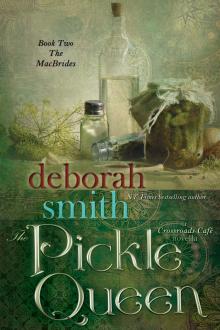 The Pickle Queen: A Crossroads Café Novella
The Pickle Queen: A Crossroads Café Novella On Bear Mountain
On Bear Mountain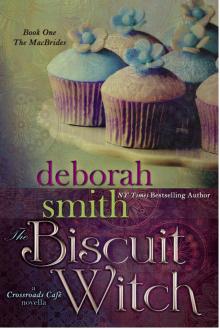 The Biscuit Witch
The Biscuit Witch Sara's Surprise
Sara's Surprise More Sweet Tea
More Sweet Tea The Apple Pie Knights
The Apple Pie Knights The Silver Fox and the Red-Hot Dove
The Silver Fox and the Red-Hot Dove Sweet Hush
Sweet Hush California Royale
California Royale Hot Touch
Hot Touch Miracle
Miracle The Stone Flower Garden
The Stone Flower Garden A Place to Call Home
A Place to Call Home Silk and Stone
Silk and Stone Honey and Smoke
Honey and Smoke Jed's Sweet Revenge
Jed's Sweet Revenge Silver Fox and Red Hot Dove
Silver Fox and Red Hot Dove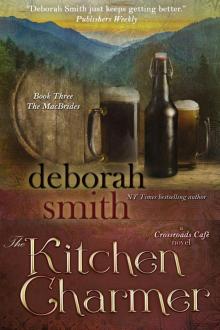 The Kitchen Charmer
The Kitchen Charmer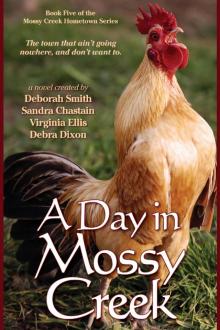 A Day in Mossy Creek
A Day in Mossy Creek Never Let Go
Never Let Go Summer in Mossy Creek
Summer in Mossy Creek On Grandma's Porch
On Grandma's Porch The Crossroads Cafe
The Crossroads Cafe Follow the Sun
Follow the Sun The Yarn Spinner
The Yarn Spinner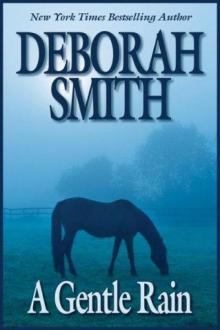 A Gentle Rain
A Gentle Rain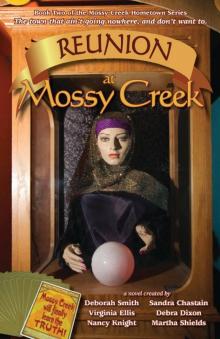 Reunion at Mossy Creek
Reunion at Mossy Creek